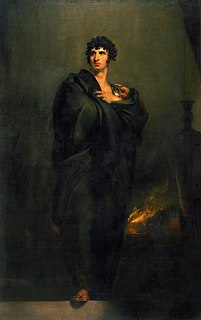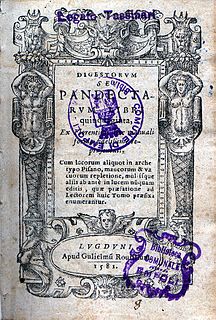Related Research Articles

The censor was a magistrate in ancient Rome who was responsible for maintaining the census, supervising public morality, and overseeing certain aspects of the government's finances.

Servius Tullius was the legendary sixth king of Rome, and the second of its Etruscan dynasty. He reigned from 578 to 535 BC. Roman and Greek sources describe his servile origins and later marriage to a daughter of Lucius Tarquinius Priscus, Rome's first Etruscan king, who was assassinated in 579 BC. The constitutional basis for his accession is unclear; he is variously described as the first Roman king to accede without election by the Senate, having gained the throne by popular and royal support; and as the first to be elected by the Senate alone, with support of the reigning queen but without recourse to a popular vote.

Germania Superior was an imperial province of the Roman Empire. It comprised an area of today's western Switzerland, the French Jura and Alsace regions, and southwestern Germany. Important cities were Besançon (Vesontio), Strasbourg (Argentoratum), Wiesbaden, and Germania Superior's capital, Mainz (Mogontiacum). It comprised the Middle Rhine, bordering on the Limes Germanicus, and on the Alpine province of Raetia to the south-east. Although it had been occupied militarily since the reign of Augustus, Germania Superior was not made into an official province until c. 85 AD.

Coriolanus is a tragedy by William Shakespeare, believed to have been written between 1605 and 1608. The play is based on the life of the legendary Roman leader Caius Marcius Coriolanus. Shakespeare worked on it during the same years he wrote Antony and Cleopatra, making them the last two tragedies written by him.

The Lex Papia et Poppaea was a Roman law introduced in 9 AD to encourage and strengthen marriage. It included provisions against adultery and against celibacy after a certain age and complemented and supplemented Augustus' Lex Iulia de maritandis ordinibus of 18 BC and the Lex Iulia de adulteriis coercendis of 17 BC. The law was introduced by the suffect consuls of that year, Marcus Papius Mutilus and Quintus Poppaeus Secundus, although they themselves were unmarried.
Masurius Sabinus, also Massurius, was a Roman jurist who lived in the time of Tiberius. Unlike most jurists of the time, he was not of senatorial rank and was admitted to the equestrian order only rather late in life, by virtue of his exceptional ability and imperial patronage. Masurius was the first person to give "state-certified opinions" (publice respondere), a privilege granted by the emperor which marked increasing imperial control over the judicial process after the end of the Roman Republic. Before the Principate of Augustus, the value of legal opinions was based on the expertise of those who gave them. The passage in the Digest of Justinian that discusses the granting of Masurius's authority is thus a pivotal point in the history of Roman law.
Lex Aelia Sentia was a law established in ancient Rome in 4 AD. It was one of the laws that the Roman assemblies had to pass. This law, has made limitations on manumissions. Manumission, or the freeing of a slave, became increasingly important by the early empire. Augustus sought to enact a series of restrictions on the practice. This law stated that for a manumission to be valid a master had to be at least twenty years old and a slave at least thirty. These limitations on manumissions were made when the number of manumissions were so large, that they even questioned the social system of the time.
Stipulatio was the basic form of contract in Roman law. It was made in the format of question and answer.
Julius Paulus, often simply referred to as Paul in English, was one of the most influential and distinguished Roman jurists. He was also a praetorian prefect under the Roman Emperor Alexander Severus.
Publius Juventius Celsus Titus Aufidius Hoenius Severianus — the son of a little-known jurist of the same name, hence also Celsus filius — was, together with Julian, the most influential ancient Roman jurist of the High Classical era.
Arrianus was a Roman jurisconsult of uncertain date. He probably lived under Trajan, and, according to the conjecture of Grotius, is perhaps the same person as the orator Arrianus, who corresponded with Pliny the Younger. He may also possibly be identical with the Arrianus Severus, praefectus aerarii, whose opinion concerning a constitution Divi Trajani is cited by Aburnus Valens. He wrote a treatise de Interdictis of which the second book is quoted in the Pandects in an extract from Ulpian. In that extract, Proculus, who lived under Tiberius, is mentioned in such a manner, that he might be supposed to have written after Arrianus. There is no direct extract from Arrianus in the Pandects, though he is several times mentioned.
Aelius Marcianus was a Roman jurist who wrote after the death of Septimius Severus, whom he calls Divus in his excerpts from the Pandects. Other passages in the same source show that he was then writing under Antoninus Caracalla, the son and successor of Severus. It also appears from his Institutiones that he survived Caracalla. It is therefore probable that he also wrote under Alexander Severus, whose reign commenced 222 AD. Caracalla died in 217. Another Aelius Marcianus is cited in the Pandects, who was proconsul of Hispania Baetica in the time of Antoninus Pius.
Gaia Afrania was the wife of the senator Licinius Buccio. Afrania was born into an old plebeian family, the gens Afrania. She lived during the chaotic time of the breakup of the Republic, dying in 48 BC. She often brought suits to court. Perhaps the sister of Lucius Afranius, consul in 60, she always pleaded her own cases before the praetor instead of waiting for male family members to defend her, thus giving occasion to the publishing of the edict which forbade all women to postulate. Valerius Maximus's narrative indicates that she was successfully able to argue her cases, although he looked upon it negatively. Ulpian condemns Afrania as the cause for the edict, stating that it was meant to prevent women's involvement in the legal business of others. He believed that it was too immodest for women and that it was a duty for males.
Pacuvius Labeo was a Roman jurist and senator, and one of the murderers of Julius Caesar. He was father of the more eminent jurist Marcus Antistius Labeo, who lived under the emperor Augustus.
Sextus Pedius was a Roman jurist during the late first and early second centuries. He was a contemporary to the Roman Jurists Aulus Ofilius and Massurius Sabinus, and also mentioned in the writings of Pomponius.
Aulus Ofilius was a Roman jurist of Equestrian rank, who lived in the Roman Republic. He is named as a jurist by Pomponius. Ofilius was a friend to Roman statesman Marcus Tullius Cicero, dictator Gaius Julius Caesar and in opinion had opposed the jurist Trebatius Testa.

Alfenus Varus was an ancient Roman jurist and writer who lived around the 1st century BC.

In the earliest times the Greeks wore their κόμη long, and thus Homer constantly calls them κᾰρηκομόωντες (long-haired).

The gens Aufidia was a plebeian family at ancient Rome, which occurs in history from the later part of the Republic to the third century AD. The first member to obtain the consulship was Gnaeus Aufidius Orestes, in 71 BC.
The gens Octavena was an obscure plebeian family at Rome. The gens is known primarily from a single individual, the jurist Octavenus, cited by a number of later authorities, although several other Octaveni are known from inscriptions.
References
![]() This article incorporates text from a publication now in the public domain : Long, George (1870). "Namusa, Aufidius". In Smith, William (ed.). Dictionary of Greek and Roman Biography and Mythology . Vol. 2. p. 1137.
This article incorporates text from a publication now in the public domain : Long, George (1870). "Namusa, Aufidius". In Smith, William (ed.). Dictionary of Greek and Roman Biography and Mythology . Vol. 2. p. 1137.